

Share
1st February 2020
09:26am GMT

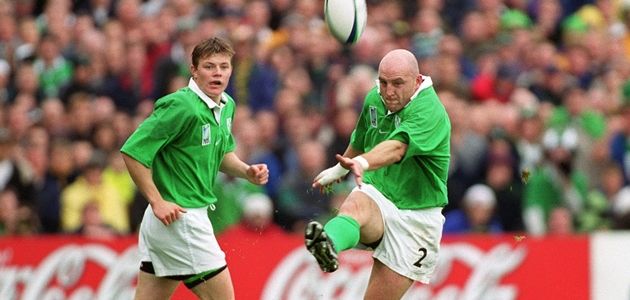 Between 1992 and 1998, Ireland ended up with the wooden spoon after finishing bottom of the Five Nations. Gatland was their third head coach in two and a half years. The Kiwi brought a fighting edge, and togetherness, to the team but so much more was needed.
Gatland, with Eddie O'Sullivan (quoted at the start) in as assistant coach and team manager Donal Lenihan, wanted to ease some fresh faces into the squad but there was a conservative selection against England for the opener at Twickenham. A 50-18 bouncing saw Gatland accelerate his plans.
Between 1992 and 1998, Ireland ended up with the wooden spoon after finishing bottom of the Five Nations. Gatland was their third head coach in two and a half years. The Kiwi brought a fighting edge, and togetherness, to the team but so much more was needed.
Gatland, with Eddie O'Sullivan (quoted at the start) in as assistant coach and team manager Donal Lenihan, wanted to ease some fresh faces into the squad but there was a conservative selection against England for the opener at Twickenham. A 50-18 bouncing saw Gatland accelerate his plans.
O'SULLIVAN: "The decision was made, let’s put it that way, that we would blood in new players and we would change our strategy. "I felt that we had some really good, young backs. We had O'Driscoll, we had Ronan O'Gara, we had Peter Stringer, who was the best passer in the world. People like Denis Hickie had been around as had Girvan Dempsey, who had fallen out of favour [before] and then Shane Horgan appeared on the wing. "We had always had a very forward orientated game but, after Twickenham, we said, 'Let's give the ball to the backs more. Let's get over the gainline and let the forwards run off that'.For the home game against Scotland, Gatland handed out Test debuts to Horgan, Simon Easterby and the Munster trio of O'Gara, Stringer and tighthead prop John Hayes. The Scots were beaten 44-22. With captain Keith Wood driving the standards, on and off the field, it was an Irish awakening but there was still a long way to go. Italy, who were added in 2000 to expand the Five Nations to Six, were beaten next and Ireland set off for Paris with an uncommon degree of expectation. There had been no Irish win in the French capital for 28 years and the losing streak looked set to continue when Les Bleus went 25-17 ahead with 12 minutes to play. O'Driscoll had already scored a brace of tries, though, and he was not yet finished.
O'DRISCOLL: I suppose I didn't pay much heed to the fact it was the hat-trick, I just knew that we were back in the game... The seriousness of the occasion probably hit me on that third try. O'SULLIVAN: The last try for Brian was a turnover, where he picked [the ball] off the ground. At that stage, he probably believed he could walk on water because he got two before that… He had the potential but you probably need a day like that to announce yourself… it really ignited his career. He became, and still is, an iconic figure in Irish rugby, and around the world. O'GARA: We all knew O'Driscoll was good, but that's when we knew the guy was a genius.Ireland won 27-25 that day and finished second in the championship to England. They would perform well in a 2001 campaign that was impacted by the 'Foot and Mouth' outbreak, and resulting travel restrictions. O'Sullivan replaced Gatland in 2002 and took Ireland to a Grand Slam decider the following year but soon-to-be world champions England had their number at Lansdowne Road. There then followed an era of Irish Triple Crown successes (three of them between 2004 and 2007) but a championship win remained elusive. O'Sullivan still laments 'being unravelled by a very good French side' on a few occasions during his time in charge. Bernard Laporte's men spoiled the first ever Ireland game at Croke Park, in 2007, but England were never going to repeat that when they arrived at GAA headquarters a month later. "That was one game we were not going to lose," remarks O'Sullivan, "as we would not allow ourselves to lose."
 Ireland beat the English 43-13 that day and Horgan scored a try - moments after claiming a cross-field O'Gara kick - that he jokingly describes being 'one of my two babies' [the other being a late matchwinner against the same side in 2006].
"I remember back in the 90s," adds O'Sullivan,"where if you won two matches as Ireland coach, you'd be celebrating. By the end of the noughties, if you won two matches you'd be fired."
That was how it ended for O'Sullivan as Ireland won only two games of the 2008 Six Nations. Allied to a poor 2007 World Cup, Declan Kidney stepped up from assistant to head coach.
Ireland beat the English 43-13 that day and Horgan scored a try - moments after claiming a cross-field O'Gara kick - that he jokingly describes being 'one of my two babies' [the other being a late matchwinner against the same side in 2006].
"I remember back in the 90s," adds O'Sullivan,"where if you won two matches as Ireland coach, you'd be celebrating. By the end of the noughties, if you won two matches you'd be fired."
That was how it ended for O'Sullivan as Ireland won only two games of the 2008 Six Nations. Allied to a poor 2007 World Cup, Declan Kidney stepped up from assistant to head coach.
"Around that time, with Ireland," says former hooker Jerry Flannery, "Munster seemed to over-deliver for the talent they had whereas Leinster, for the quality they had, seemed to under-deliver... but what happened was Leinster were eventually able to tap into that [new] talent they had coming through like Cian Healy, Luke Fitzgerald, Rob Kearney and Jamie Heaslip. They all came through with big, big work ethics and helped change things."Riding a wave from Munster's 2006 and 2008 European Cup triumphs, Kidney led his country to the brink of championship, and potential Grand Slam, glory in March 2009. Wales were the opposition in a thronged Millennium Stadium. Ireland trailed 6-0 at the break but O'Driscoll scored three minutes into the second half before a superb dink over the Welsh lines teed up Tommy Bowe for a memorable try.
FLANNERY: With ROG there, he was so good at running onto the ball and kicking in motion. And when you've got somebody with Tommy's pace... And I know Tommy had been criticised that year, with some people in the media were saying, ‘Oh, Tommy Bowe isn’t that quick’. He showed that pace on the day and it was a well executed score.Those two tries, both converted by O'Gara, put Ireland 14-6 ahead but Stephen Jones penalties and a drop goal put Wales 15-14 up with six minutes to go. The Irish forwards worked their team back into a scoring position, however, and O'Gara responded with a drop goal of his own.
O'GARA: That's what you're put on the pitch to do, that's my bread and butter, that's what you've got to do. You create moments like that, you know it's coming down to either a penalty or a drop goal.Over it went.
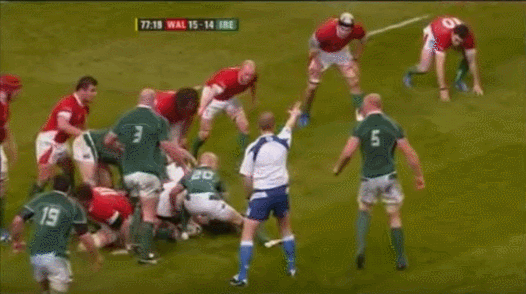 There were still two minutes on the clock but Wales were being repelled by stern Irish defence. Kidney's men just needed to keep their discipline but Paddy Wallace was drawn into conceding a penalty at the breakdown. Referee Wayne Barnes gave Jones a chance to deny Ireland their first Grand Slam in 61 years.
There were still two minutes on the clock but Wales were being repelled by stern Irish defence. Kidney's men just needed to keep their discipline but Paddy Wallace was drawn into conceding a penalty at the breakdown. Referee Wayne Barnes gave Jones a chance to deny Ireland their first Grand Slam in 61 years.
FLANNERY: At the end, the last 5 or 10 minutes of that game were so crazy… when Stephen Jones, when the penalty was awarded, I just went, ‘Oh that’s it. We’ve lost’. O'DRISCOLL: I thought, 'God, what a kick in the teeth that is... we'll still win the Championship on points difference, but it will feel like a hollow victory because we want that elusive Grand Slam'. Thankfully, the kick went a metre short. WALLACE: Wayne Barnes tapped me on shoulder a couple of months later when he was reffing another match - and we were at a dinner or something after the game - and he said, 'Listen, apologies, I checked that on the video and probably, if I got to the ruck a couple of seconds earlier, I would have penalised the Welsh man for holding on but my view was slightly blocked at the time. Whenever I arrived you looked like you had come in from the side so sorry about that.' And I was like, 'Yeah, thanks!'"Jones' kick looked on the money for so long but it dropped under the crossbar and Geordan Murphy had the honour of despatching the ball from the pitch to end the match and confirm Ireland's second ever Grand Slam.
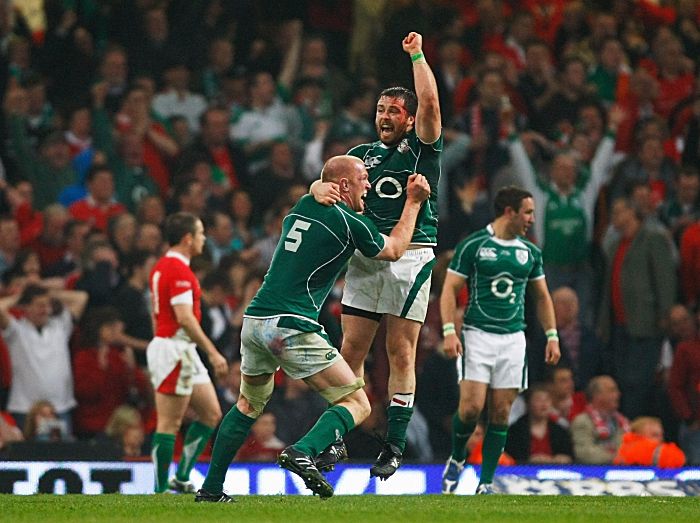 Kidney made way for Joe Schmidt in 2013 and the IRFU's call, not for the first time, paid off as Ireland won a Six Nations championship under the stewardship of a newly installed coach. For O'Driscoll, the 2014 success was a fairytale ending.
Interviewed by a French reporter on the Stade de France pitch - 14 years on from his hat-trick heroics - he declared, 'Je suis trés content'.
Kidney made way for Joe Schmidt in 2013 and the IRFU's call, not for the first time, paid off as Ireland won a Six Nations championship under the stewardship of a newly installed coach. For O'Driscoll, the 2014 success was a fairytale ending.
Interviewed by a French reporter on the Stade de France pitch - 14 years on from his hat-trick heroics - he declared, 'Je suis trés content'.
FLANNERY: I was delighted as an Irish fan, first of all, that they were successful. Also, the nature of how we won. It wasn't down to one guy. For me, Andrew Trimble and Devin Toner were two of the stand-out guys for us, and they wouldn't have been lauded or anything before the tournament. I really enjoyed that aspect of it. And particularly then with guys like Gordon D'Arcy and Drico. I remember a few years ago when Darce had a lot of injuries and thought he wouldn't play again... He outlasted everyone; it was great. I was delighted for him.Ireland successfully defended their Six Nations crown the following year but they were left sweating on the final scoreline in the evening game between France and England. Stuart Lancaster's side put the French to the sword but they could not find the late score that would have seen them overtake Ireland atop the standings. Ultimately, when all the final points tallies were confirmed, Jamie Heaslip's last-gasp, try-saving tackle on Stuart Hogg in a game Ireland had already won, and by some distance, proved the clincher. D'Arcy described it as 'probably the most important tackle' of Heaslip's life and he was spot on.
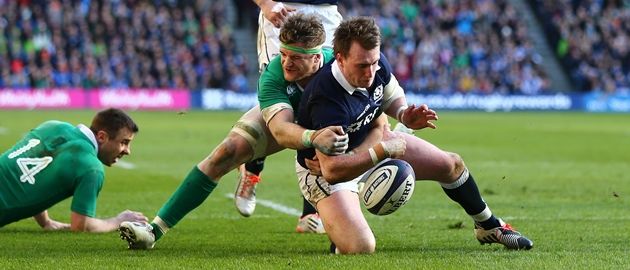 Eddie Jones' England were Grand Slam champions in 2016 and came to Dublin in March 2017 determined to double down on that Slam success. Minutes before kick-off, Ireland lost Heaslip to a back injury that would, in time, end his career. Schmidt was forced to re-jig his starting XV, bringing in Peter O'Mahony, and Dan Leavy was told to get his gear on. He was elevated from 24th man to the bench.
Leavy ended up playing the final 15 minutes for his second Test cap as the hosts won out 13-9 to take the day, if not the championship. As it would turn out, it was quite the marker for this Irish team to lay down. Leavy was representative of the new generation of young players bursting through while Conor Murray and Johnny Sexton's half-back partnership was at its' peak and rightly declared world-class.
Eddie Jones' England were Grand Slam champions in 2016 and came to Dublin in March 2017 determined to double down on that Slam success. Minutes before kick-off, Ireland lost Heaslip to a back injury that would, in time, end his career. Schmidt was forced to re-jig his starting XV, bringing in Peter O'Mahony, and Dan Leavy was told to get his gear on. He was elevated from 24th man to the bench.
Leavy ended up playing the final 15 minutes for his second Test cap as the hosts won out 13-9 to take the day, if not the championship. As it would turn out, it was quite the marker for this Irish team to lay down. Leavy was representative of the new generation of young players bursting through while Conor Murray and Johnny Sexton's half-back partnership was at its' peak and rightly declared world-class.
LEAVY: If you’re a young player and you get an opportunity to play, and you get one shot… and it might be because someone pulls out in a warm-up or, you know, whatever happens, you really got to take your shot and put your hand up. There’s no, like you know, if you get a shot to go and play for Ireland, the worst thing you can hear is someone saying, ‘Oh you’re young. You’ll grow into the role’. You want it now and you want to play straight away.2018's Grand Slam quest could have been spiked as early as the first game. Ireland were under-par against the French in their opener but an incredible 41-phase drive put them into a position for Johnny Sexton to provide his own timeless matchwinner.
O'MAHONY: You know, you got 41 phases, you see the amount of… the cross-field kick to Keith Earls. Earlsy gets up over the French winger. Incredible take. Concentration levels. That breakdown is, you know, 20 yards from the next Irish person but guys turn up, you know. You’re just on autopilot and you’re just trying to add as much as you can. And thankfully he knocked it over because I don’t know how much of us we had left in the tank at that stage.
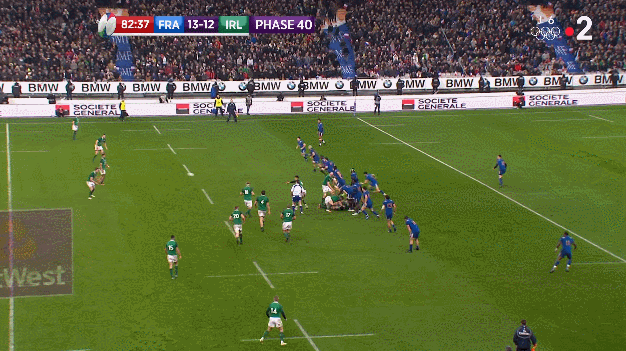
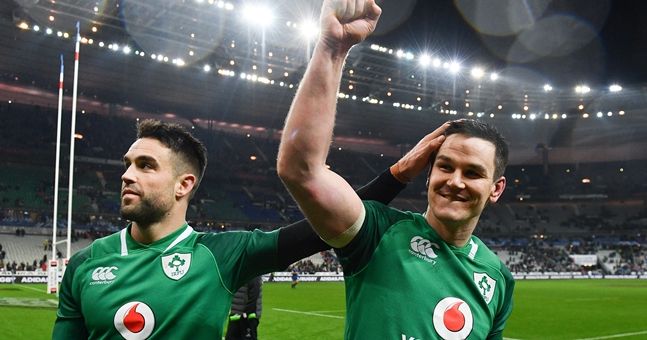 Wins over Italy, Scotland and Wales followed - with Jacob Stockdale well on his way to a Six Nations try-scoring record - and the roles were reversed as Ireland travelled to London for a Grand Slam decider against the English.
For the opening hour, just about everything Ireland tried came off. With 10 minutes to go, the result looked signed and sealed. For a nation so used to receiving our sporting victories amid nerve-wracked bouts, the closing stages were as surreal as they were serene.
Wins over Italy, Scotland and Wales followed - with Jacob Stockdale well on his way to a Six Nations try-scoring record - and the roles were reversed as Ireland travelled to London for a Grand Slam decider against the English.
For the opening hour, just about everything Ireland tried came off. With 10 minutes to go, the result looked signed and sealed. For a nation so used to receiving our sporting victories amid nerve-wracked bouts, the closing stages were as surreal as they were serene.
O'MAHONY: We certainly played well that day. It was, yeah, it was nice feeling afterwards. It was a nice feeling during it. It was one of those games that it wasn’t nail-biting for the last three minutes. It was nice to be able to enjoy that. They’re the kind of days you want to try and recreate and do special things. MURRAY: We’ve been together for a long time. We understand each other as a team and the ability of the team – we have no fear of holding on to the ball. Where probably in my early days playing in the Irish team, against big teams, you’re kind of just hoping to get through the game, nearly... Now, it’s every team that we go out against, we genuinely believe we can win.Ireland's title defence of 2019 was over before it started. England avenged their loss in thumping style and while Schmidt's side rebounded with wins over the Scots, Italians and French, it was Wales - with Gatland in his final championship for that nation - that ended their feint hopes. With it they won a Grand Slam of their own. In keeping with every Irish coaching change of the Six Nations era, the assistant (Andy Farrell this time) has succeeded the head coach. In keeping, too, is another disappointing World Cup campaign in the rear-view. Farrell has named Sexton as his captain and called up five uncapped players. After 11 years of assisting the top man, Farrell is determined to make his own mark on this team.
FARRELL: I want to be myself. I've got an idea on how I want to play the game and I want my team to stand for those ideas. We're going to make sure that we stand for something properly, first and foremost. Every coach wants to put his own stamp on his team. We need an identity and hopefully that'll be evident as the games unfold.Four championships in 20 editions of the Six Nations but the added sheen of two Grand Slams and some performances that will live on in the memory for years to come. We want more. Of course we do. That's only natural, but it hasn't always been the way. *Additional reporting by Rob O'Hanrahan*